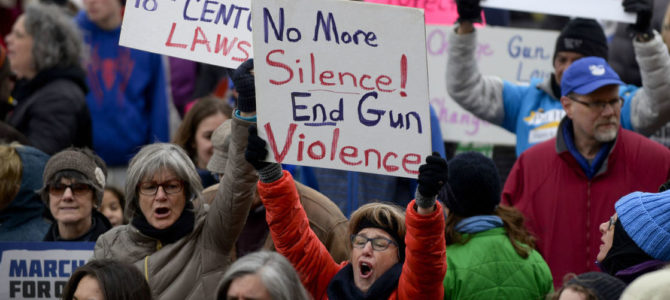
Over the weekend, hundreds of thousands of kids marched for gun control in Washington DC and other cities. The protests themselves, I was told, were what participatory democracy looks like — an event worth celebrating whether you agreed with the marchers or not. Indeed, the very act of caring, whether or not these kids fully understood the issue, was a laudable example of civic responsibility. To point out the numerous misleading and ugly partisan attacks they leveled was not only a low blow against the children, but an assault on free expression.
These are convenient myths. For starters, chanting crowds of emotionally charged protestors aren’t exhibiting any great American virtue. Mass protests aren’t only often antithetical to the aesthetics of republicanism, but sometimes they undermine its purpose, as well. In our system, inalienable rights — including the one to self-defense — can’t be swept away by angry crowds.
Marching in the streets and condemning your ideological opponents as abettors of mass murder is just a common impulse of passion, a growing and caustic ingredient in American political life. We see it online all the time. Simply because you scrawl your thoughts on a sign rather than tweet them to your friends doesn’t imbue them with any more pertinence. This goes for all of us. Yet we live with the insufferable need to act as if protesting is tantamount to patriotism rather than a collective act of frustration. This is merely confusing activism with good citizenship.
Of course, the reason for the media’s favorable and idealistic coverage of these marches is that its own position comports with gun control. This idealization of people practicing their First Amendment rights certainly does not extend to the National Rifle Association, which is also lawfully exerting its right to petition the government.
But like anyone whose aspirations are tethered to politics — another un-American instinct — these kids are going to be frustrated by the results. In this country, marches are rarely good barometers of public sentiment. That’s not to say marches don’t occasionally reflect the prevailing politics of the day, it’s simply to say that they rarely change the trajectory of events.
In the common hagiographic rendering of the 1960s, for example, protesters stopped the Vietnam War. But unless you’re arguing that the protesters were so irritating their actions finally led to Richard Nixon’s landslide victory in 1972 against George McGovern, and that allowed Nixon to end the Vietnam War, it is just revisionism. For that matter, the Tea Partiers did not stop Obamacare, the One Percenters could not stop basic economics, and anti-war protesters did not stop the Iraq War.
It’s unlikely that kids being propped up by gun control activists will change the dynamics of this debate, either.
Like with all things, there are exceptions. The civil rights marches, in which Americans demanded that all individuals be protected equally under the Constitution, were successful. In tyrannies — which you might be led to believe we live in if you listen to p*ssy-hatted marchers — they are also consequential. The protesters of Tienanmen Square and the Prague Spring were, in fact, marching for their lives. Even the Americans who stood up against the Stamp Act did so in contempt of authoritarian rule, risking everything. Not getting your preferred national legislation passed in a federalist system of government isn’t repression. Sorry.
In ideological terms, marching is a leftist ideal. The theatrics of this march, as many others, rested on a giant ad populum fallacy. It is a call to justify government’s interference on the basis of popular will and fearmongering regarding public safety — or, more specifically, on making people feel safer. It is why we should be thankful that the anti-federalists insisted we write these self-evident truths down.
Now, it’s debatable whether most of these kids understand that they attend schools that are safer than ever in a nation that has bequeathed them more freedom and wealth than any other group in the history of the world. It’s almost certain, however, that the adults who stand behind them don’t care that the Founders were antagonistic toward arguments predicated on feelings. What they do seem to believe is that if you’re louder and more passionate, if you care enough, you win.
“So tonight—to you, the great silent majority of my fellow Americans—I ask for your support,” Nixon famously said in 1969. In this sense, the great silent majority was about politics (Nixon probably cribbed the line from Warren Harding), but for decades it was a term that meant the dead, or the legacy and traditions they left us.
The “right of the people peaceably to assemble, and to petition the Government for a redress of grievances” is one of those inheritances. It guarantees that people can march without worrying about punishment or reprisals from the state. No one is saying Americans don’t have the right to protest. But nothing in a free country compels us to celebrate what they’re doing, either.









